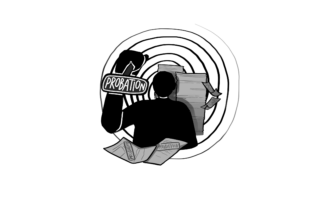This editorial represents the unanimous opinion of all 13 Outlook editors of the 2013-14 school year.
To ensure that student-athletes prioritize academics, the San Mateo Union High School District (SMUHSD) requires its students to have a minimum unweighted GPA of 2.0 and to pass 25 credits to play on an athletic team. If a student fails to meet either of these requirements by the end of a grading period, they will be ineligible to participate in sports competitions until the end of the next six-week grading period, provided their grades sufficiently improve.
While some coaches allow ineligible players to come to practice, the fact that ineligible athletes cannot compete leads many coaches to drop them from the team, or at least suspend them until they regain eligibility. But with players missing up to six weeks of practice before they can be reinstated on the team, their seasons are effectively over.
Eligibility would not be an issue if it only affected a few students. But this season, seven would-be boys soccer players were unable to play in the first games of the season because of academic ineligibility.
Participation on sports teams benefits student’s high school experiences and encourages valuable skills, such as collaboration and dedication. When seven players on one team are withheld from such participation, it is time to ask whom the current policy is actually helping.
The current eligibility policy exists to encourage student athletes to focus on their grades. It operates under the belief that the ability to participate on sports teams is valued enough to motivate students to improve their grades in order to qualify. For instance, if a baseball player was to realize that the end of a grading period was approaching and he was failing two classes, he would likely be motivated to improve his grades in those classes in order to avoid being unable to play in his teams’ upcoming game.
Such an expectation is well founded; meeting eligibility to play sports does indeed motivate many students to improve and maintain their grades. But the fact that eligibility is determined exclusively at the end of each six-week grading period creates some serious issues with the current system.
For a player to be motivated to achieve eligibility, he or she must operate under the belief that he or she will be able to play on the team when he or she regains eligibility. If a player is ineligible at the beginning of the season and misses try-outs, that player will not be motivated to improve his or her grades because there will be no chance of rejoining the team. Such a scenario is replicated if a coach cuts a player for being ineligible, or even if a player misses six weeks in the beginning of the season and is effectively unable to rejoin the team.
When players are made ineligible at the end of a grading period, they should be given a grace period in which they can attempt to improve their grades before they are withdrawn from competition. Besides allowing individual players time to get serious about their grades, such a grace period would encourage a player’s teammates and coach to become invested in the player’s academic career; a coach and a team would have great interest in ensuring their teammate would be able to compete as the season progresses. Already, coaches like Steve Sell, Aragon’s head football coach and athletic director, mandate team-wide study sessions, in order to ensure the team continues to operate with all possible players.
The 2.0 GPA standard the district uses comes from the regulations of the California Interscholastic Federation (CIF), the agency in charge of governing high school sports in California. In its bylaws, the CIF allows for school governing boards to institute an optional “Probationary Period.” The “Scholastic Eligibility” stipulation under Section II of the agency’s constitution states, “The governing board of each school district, private school, or parochial school may adopt, as part of its policy, provisions that would allow a student who does not achieve [the proper requirements] in the previous grading period to remain eligible to participate in interscholastic athletics during a probationary period. The probationary period shall not exceed one semester in length, but may be for a shorter period of time, as determined by the governing board of the school district, private school, or parochial school. A student who does not meet the above requirements during the probationary period shall not be allowed to participate in interscholastic athletics in the subsequent grading period.”
The governing board of the SMUHSD does not currently allow such a probationary period. While ostensibly the board believes that its policy reflects its commitment to academics, allowing a probationary period would actually provide motivation to students to improve their grades and nurture an environment where the grades of team members are a team priority. A probationary period should be allowed.


